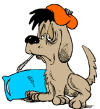Dr. Jane Bicks talks about allergies and skin problems in dogs
and the role that the immune system plays in preventing dog skin problems.

A healthy immune system is designed to recognize and eliminate any foreign
protein or other substance from the body.
When the immune system over reacts (which can cause harm to the animal),
that reaction is termed an allergy or sensitivity.
While veterinarians and allergists distinguish between the two terms based
on their chemical reactions, the dog and it's owner don't.
All they know is that the dog is uncomfortable and has problems:
excessive biting and scratching
hives
hair loss
vomiting or diarrhea
runny eyes
bronchitis
asthma
sore ears
chin acne
etc.
It is obvious that something does not agree with the dog. The foreign agent
may have entered the body via the following means:
- ingestion of food ingredients, herbs, or medications
- Inhalation of airborne substances (like pollens, smoke, dust, dust
mites, feathers, mold, toxin, etc.)
- Body contact with grass, carpet, soap, lotions, flea- control products,
etc.
- Injection of insect venom
Determining that a condition is an allergy or sensitivity rather than a
real disease takes veterinary know-how.
Once your veterinarian is sure that the symptoms are due to a reaction,
it's your job to play Sherlock Holmes and discover the substance that is
causing your dog to over react.
The easiest way is to limit your dog's exposure to any substance that might
cause a reaction.
A contact allergy/sensitivity generally creates symptoms "at the point
of contact." Food, injection and airborne substances can create any of
the symptoms mentioned above.
Contact allergy or sensitivity will generally cause an area to become
irritated, itchy, swollen, or otherwise abnormal looking. Depending on the
area involved, keep the dog away from anything that would touch it.
If your dog's belly is irritated, chances are he's lying on something that he
shouldn't be. Keep him off grass, carpets, bedding, etc. until the reaction
calms down. If his chin is red, change food bowls.
Ingestion of allergy or sensitivity can cause gastrointestinal or skin
problems. The most common allergy-causing food ingredients include: milk,
cheese, chicken, soy, wheat, and beef.
Go back to basics, serving your dog a food with a protein he has never eaten
before and a gluten-free carbohydrate (rice or potatoes).
Your veterinarian may be able to special order you a food from Nature's Recipe
called Innovative Diet (duck and potato or venison and potato).
Investigating the cause of allergy requires that you feed only the one food
you have selected and nothing more! That means no rawhide, treats of any
types, people food, etc.
If your dog is used to treats, put some of the non- allergenic dry food in a
treat container and make believe. Only monthly heartworm pills, other
medications, and pure water are allowed.
Check out my
Recommended Treats Here
If your dog's symptoms are the result of something in the food (s) you were
feeding, positive results should be seen in from one week to one month.
Inhalant or injection allergies are the most difficult to determine. Blood
tests are available but they are costly and can be inaccurate. Skin testing is
your best bet, but it is expensive and time consuming.
Plan of Action
- Go to your vets and have him determine if the reaction is an
allergy or sensitivity rather than a disease
- Eliminate any possible causes
- Get your dog on a food and supplement that will help to
strengthen the immune system and contains no chemicals or common
allergens.
- Give your dog pure, distilled water to drink.
- Give your dog a supplement that contains Omega-3 fatty acids
- Provide the dog with a quality anti-oxidant supplement
Life's Abundance food contains no common allergens, plus has the high
quality proteins from meat sources that a dog needs to build strong, healthy
tissue. It also contains Activin, a patented and very powerful anti-oxidant.
How to Keep your Dog &
Cat Healthy
If your dog suffers from:
- Irritated skin
- Excessive itching
- Scratching & biting
- Flaky skin
- Dry or oily skin
- Excessive shedding
- Odorous skin
- Dull or brittle coat
- Allergies
Poor nutrition and allergies are the most common causes of skin & coat
problems, which can lead to dry, flaky or odorous skin, dull, brittle coats,
excessive shedding and sores from frequent scratching and biting.
Food alone cannot always supply all
the nutrients your dog needs to keep it's skin and coat in good condition.

The Life's Abundance Skin & Coat Formula is specially formulated to
provide your dog with natural, wholesome skin and coat nutrients including
vitamins A, D, E and fish oils (omega fatty acids).
Cornell University Feline Center
has successfully demonstrated the positive effects of fish oils in managing
skin flare ups and other skin conditions.
While the skin and coat formula is working from the inside out, apply Dr.
Jane's Soothing Mist Spray topically. It works from the outside in to soothe
problem areas, nourish the skin, and revitalize your dog's coat.
Skin & Coat
Formula Here
Archie
